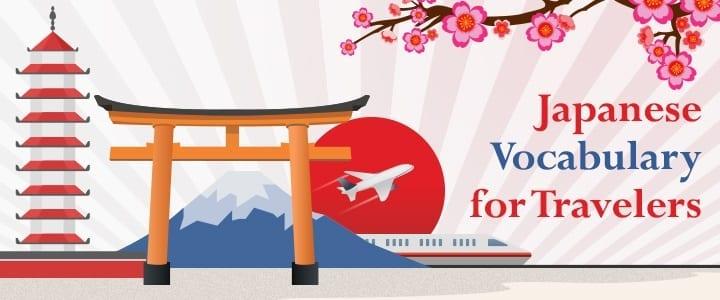Are you traveling to Japan in the near future? If so, it’s important that you learn some basic Japanese vocabulary words.
Otherwise, you might find yourself struggling to communicate with locals. In this blog post, we will provide a list of 15 essential Japanese vocabulary words for travelers.
We hope you find it helpful!
What Are the Most Used Japanese Words?
There are many vocabulary in Japanese words associated with travel, and some of the most commonly used are listed below.
- 旅行 (ryokou): This word simply means “travel,” and can be used to refer to any kind of trip or journey.
- 旅程 (ryokou): This word refers to the actual route or itinerary of a trip.
- 旅費 (ryohi): This term covers all of the costs associated with travel, including transportation, lodging, and food.
- 目的地 (mokutekichi): This word refers to the destination of a trip.
- 移動 (idou): This word literally means “movement” or “to move,” and is often used to refer to travel by car, train, or plane.
- 旅客 (ryokaku): This word is used to refer to travelers or passengers.
Ready to board? Sign up for Japanese lessons and you’ll be ready for wherever your travels take you in Japan – learn more about the benefits of taking Japanese lessons by watching the video below:
https://www.youtube.com/watch?v=kTtW06_si80
Japanese Vocabulary List for Travelers
You don’t have to master the entire Japanese language to be able to communicate on a basic level with native Japanese speakers. When it comes to basic communication, a few essential words and phrases can help you get by on your trip to Japan. Whether you’re taking Japanese lessons or planning a trip to Japan, here are the Japanese vocabulary words you should know.
Traveling to Japan
Whenever you travel to a new country, you need your passport. The Japanese word for passport is pasupoto (pah-soo-pohh-toh). You will take a hikoki (airplane) to travel to Japan, and you will fly into the kuko (airport). When you arrive, grab your sutsukesu (suitcase) from the baggage claim.
Getting Around Town
Once you leave the kuko (airport), you can find a takushi (taxi), ride the basu (bus), take the densha (train), or ride the chikatetsu (subway). If you’re taking the bus, train, or subway, you will need to purchase a kippu (ticket). You can pay for your taxi, bus, or train with okane (money).
Make sure you count your money before you leave! Learn to count in Japanese with this infographic: Japanese numbers 1 – 10.
SEE ALSO: The Most Common Japanese Dialects
At the Hotel
Once you figure out which type of transportation to take, you will want to go to your hoteru (hotel). The concierge can help you check in to your rumu (room), and make sure you get your kī (key) to open the door. When you get to your room, make sure the beddu is comfortable, so you can get some rest after your long day of traveling!
How to Learn Japanese Vocabulary for Travel
When traveling to Japan, it is helpful to learn some basic Japanese vocabulary. However, with thousands of different kanji characters, it can be difficult to know where to start.
Here are some tips.
Aim for Consistent Japanese Vocabulary Practice
If you’re studying Japanese, one of the most important things you can do is to build up a solid vocabulary base. A large vocabulary will give you the ability to communicate more effectively and understand native speakers more easily.
One way to build your vocabulary is to practice regularly. aim for consistent practice rather than cramming sessions right before tests or exams. Try setting aside some time each day to review new words and practice using them in sentences. You could also try using a flashcard app or keeping a notebook with all of the new words you’ve learned.
Get a Book or Guide to Remind You of the Basic Japanese Vocabulary Words When You’re On the Road
While there are many excellent resources available online, nothing beats having a physical book or guide to refer to when you’re on the road. Look for a practical travel guide that includes key phrases and vocabulary for everyday situations. Alternatively, opt for a more comprehensive language learning book that will teach you the basics of grammar and conversation.
Try Japanese Vocabulary Flashcards
One way to make learning Japanese easier is to use vocabulary flashcards. These cards can help you memorize the characters and improve your pronunciation. Additionally, they can provide valuable practice with grammar and sentence structure.
Get a Buddy to Practice Basic Japanese Vocabulary Words
Studies have shown that one of the best ways to learn a new language is to practice regularly with a native speaker. If you’re interested in learning Japanese, one great way to get started is by finding a buddy who can help you practice basic vocabulary words.
Not only will this give you an opportunity to learn correct pronunciation, but you’ll also get some insight into the culture and daily life in Japan. In addition, having a regular study partner will help to motivate you and keep you on track.
Use Apps for Japanese Vocabulary Learning on the Go
One of the best ways to learn a new language is by immersing yourself in it as much as possible. But if you can’t jet off to Japan for an extended stay, there are still plenty of ways to get some authentic Japanese practice in your everyday life.
One great option is to use one of the many apps that are now available for Japanese vocabulary learning. These apps can be used on your smartphone or tablet, and they make it easy to sneak in a few minutes of Japanese practice whenever you have a spare moment. Many of them also include games and other activities to help keep things fun and engaging.
So whether you’re waiting in line at the grocery store or riding the bus to work, take advantage of those few spare moments by using an app to learn some new Japanese vocabulary.
Hit the Road!
Traveling is an excellent way to learn about new cultures, and there is no better way to immerse yourself in a foreign culture than to live with a local family.
If you are interested in learning Japanese, there are many programs available that allow you to stay with a Japanese family and attend classes at a local school. This is an ideal way to learn the language, as you will be able to practice your speaking and listening skills on a daily basis.
In addition, you will have the opportunity to experience traditional Japanese culture firsthand. From food and fashion to religion and architecture, living with a Japanese family will give you a well-rounded view of this fascinating country.
So if you’re looking for an immersive Japanese language learning experience, consider hitting the road and staying with a local family. You’re sure to come away with a greater understanding of both the language and the culture.
What is the Easiest Japanese Word?
There’s no simple answer to this question.
Japanese is a very unique and interesting language, with many different words for common concepts. For example, the word for “travel” can actually be written in two different ways depending on the context. The first way is 旅行 (ryokou), which is used when referring to travel in general, such as taking a vacation or going on a business trip.
The second way is 旅 (tabi), which is used specifically when referring to travel by foot, such as hiking or backpacking. While both words are technically correct, 旅行 is typically the more commonly used word, making it the easiest Japanese word for travel.
Nevertheless, these 15 words will help you get around during your trip to Japan. While you’re exploring, you will run into lots of native Japanese speakers; make sure you’re prepared with these essential Japanese phrases.
Consider these tips today and sign up for lessons. You’ll be on your way to learning the basics of Japanese in no time!

Want to learn even more Japanese vocabulary? Search for a Japanese tutor today!
Maile Proctor

